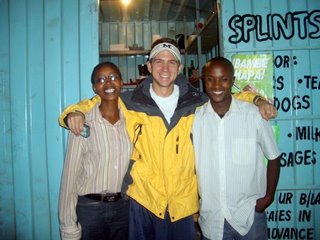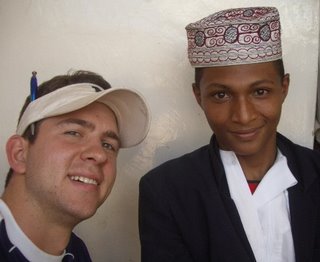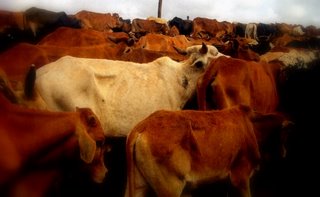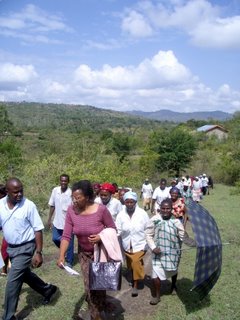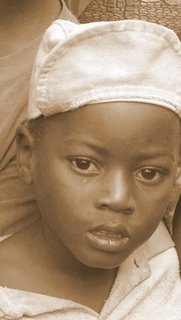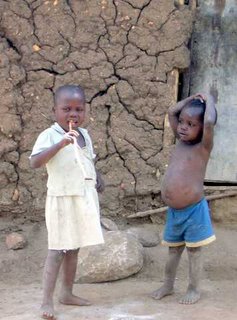
Uganda. A land undulating in green waves of growth, where the AIDS prevalence has been vastly reduced and a president continues his 20-year reign, winning a reelection only after changing the constitution and imprisoning his main opponent.
I traveled here with a group of other Americans, visiting a
partner program working with families ravaged by HIV/AIDS. Thanks to large donor aid, including USAID, and a focused educational slogan of Abstinence, Be faithful and Condom usage, the prevalence rate is one of the lowest in sub-Saharan Africa, and yet the disease’s effects will be felt for years to come.
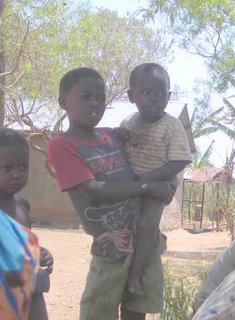
We visited homes headed by boys and girls no older than me, taking care of a grandparent or two as well as several siblings. CWS’
Giving Hope program provides dairy goats and vocational training in skills such as sewing, so that these families can increase their nutrition and possibly their incomes. It was the middle of the day and we saw so few middle-aged adults, but the others would not be returning from the fields at dusk. The process is slow: one does not simply ‘bring back’ a lost generation.
I herded our scattered visitors towards a woman beginning to speak her life story. Standing behind them, I felt more like an observer than a participant, a shepherd among sheep. After all, I had been here before and they had not. This story was for them and not for me.
The woman, Olive Namsuki, spoke of being ostracized by her community because of the virus she received from her deceased husband. She had walked many kilometers on a foot malformed by disease to talk with us. She had no idea where the money would come from to pay for her medical treatment, send her children to school or feed her family. Breaking her solemn stance, she placed her hand over her mouth as the pain overwhelmed her entire body, collapsing into her friend’s arms.
I looked away, not able to bear this woman’s suffering, let alone bear witness. Habits chained my heart to the cellar within the walls of my chest. People had been reduced from their dynamic lives to freeze-frames on my computer screen. The camera was my eyes, a portal to a film playing out before me. I’d been “routinized” to a reality I no longer lived or engaged in.

We bid farewell to Olive the way we all do in situations of another’s unfathomable pain; with light pats on the back and lips that grimace a smile. There would be no encouragement found today, except that a life has gone on and another will go on. I looked up from my seat in the van to see the frame of a retired man in the front, shuddering. Tears flowed into and over the crevices and divots of his face. Blowing his nose, he said, “It’s just so sad.” Again, I looked away.
We left another home, another family, another village. Children, looking up from their dirt playground, stared at the SUV caravan rolling by. Some pointed, some shouted, all stared. I smiled and waved, and the reaction was immediate: some waved, some ran after us, all smiled.
Finally the tears welled up in my eyes. All I had to give was a smile and a wave. Would it brighten their day? Would it make a difference? Or would it just make me feel better?

Halfway through my year in East Africa, I have seen a lot of impoverished places. A sense of need, a sense of duty to respond to such outrage has arisen within my heart, only to hit the external realities and cool into an impermeable crust. What can I possibly do to affect change? Perhaps this is what God means by the hardening one’s heart.
When we respond to the woes of this world with our own particular discernment or religious understanding, we will be overwhelmed unto despair. When our simple, safe solutions are crushed with life’s tragic complexities, how do we respond? Will we be jars of clay or reeds that bend? Eventually we all break, and we are in need of a Savior.
We walk by faith, not by argument. We are guided by the unseen, not by what can be proved in a court of law. We are the poor in spirit, the broken-hearted, and we cling to our vessels of hope and love. And when these jars of clay break, warm flows of softness will pour faith into God’s most beloved, the downcast and downtrodden.

Who will fill the cracks? Who will heal the broken-hearted?
Lord, break us once more, to fill us again.
*Reflection based on John 16:29-31 and Oswald Chamber’s My Utmost for His Highest, 2/28




















